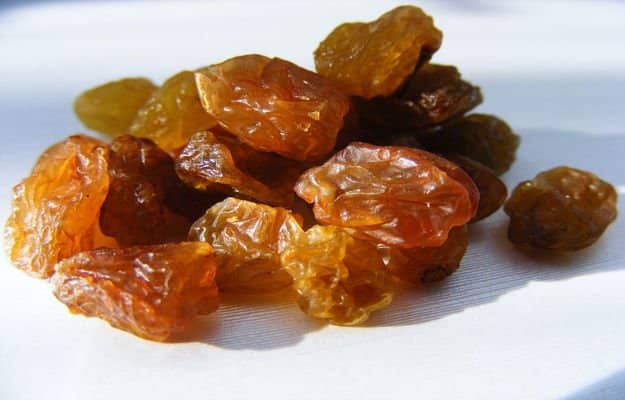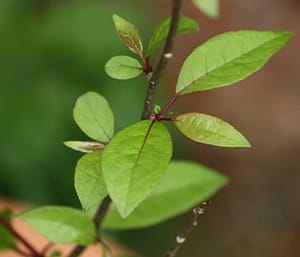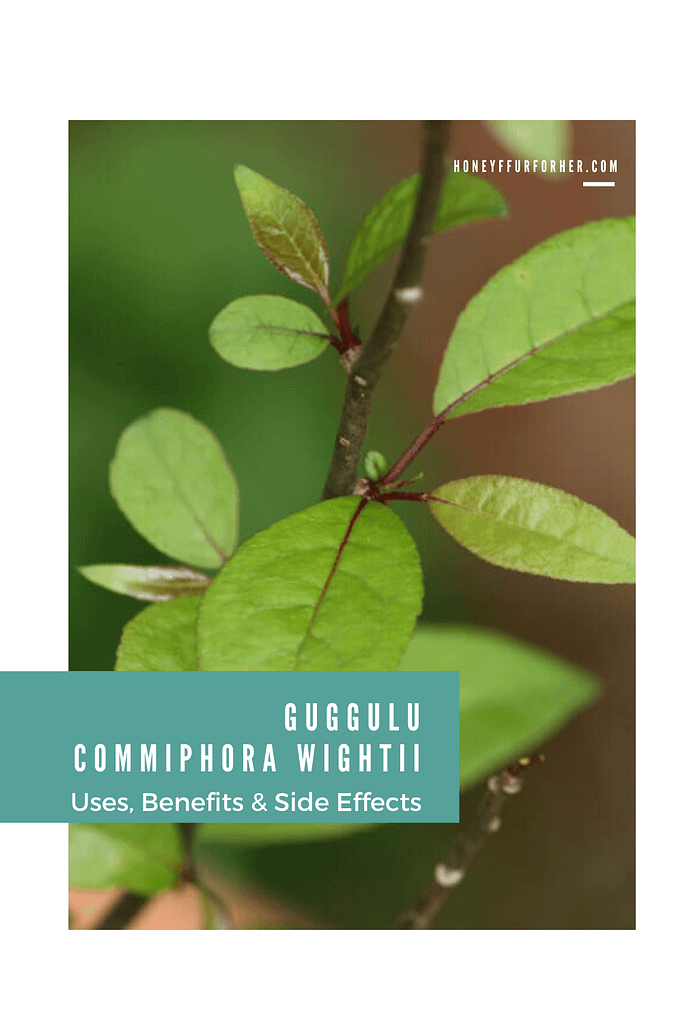Medical Reviewer: Dr Surabhi Rawat
Guggulu is popular among people since ancient times for being an ayurvedic herb that is helpful in many conditions. Guggulu, a Sanskrit as well as Hindi term means ‘that which provides protection against diseases’. Guggul is mentioned as Gulgulu in the ancient Atharva Veda and is described as ‘Agni Sthana’ as it was used as Dhupa or incense. The Veda gives Guggulu the status of God and says:
The diseases also flee away in all
Directions from him like horses and deer.
O! Gulgulu, either born from Sindhu
Or from the sea, I enchant your name
Of both types for the removal of diseases.
Guggulu also finds mention in the greatly revered Ayurvedic texts like Charaka and Sushruta Samhita. Charaka Samhita groups Guggulu in sanjnasthapania varga which is a group of drugs used for the restoration of consciousness. The Sivapuarana calls it a fragrant gum resin used for worshipping Shiva.
Guggulu which belongs to the Burseraceae family is known as Indian bdellium in English, with Commiphora wightii being its botanical name.

Plant Anatomy And Distribution
Guggulu grows as a small tree or shrub, majorly found in the western arid regions of the Indian sub-continent. Veda commentator Sayana mentions two sources from where Guggulu was obtained, the seacoast and Sindhudesa. Today it is also grown in many areas of northern Africa.
The thin branches of Guggulu are often covered with thorns and the fruits are round in shape and red in colour.
Types of Guggulu
There are five types of Guggulu that are mentioned in Kaiydeva Nighantu:
1. Mahishaksha
2. Mahanila
3. Padma
4. Kumuda
5. Hiranaya
Properties And Uses
Commiphora wightii is cultivated for its innumerable medicinal and therapeutic characteristics. The gummy resin called guggulipid or oleoresin which exudes from the branches of the plant is used for commercial purposes due to its myrrh like fragrance. It is manufactured into incense sticks and perfumes. The same gum has medicinal properties and forms a constituent of many Ayurvedic and Unani drugs. Excessive tapping of the shrub has also resulted in its endangerment. Today, Commiphora wightii finds mention in IUCN list of threatened species.
Guggulu’s medicinal properties are as follows:
- Anti-atherogenic
- antipyretic
- antiseptic
- Anti-hypercholesterolemic
- anti-inflammatory
- antispasmodic
- anti-suppurative
- diaphoretic
- immunostimulant
- disinfectant
- diuretic
- enhances phagocytosis
- aperient
- demulcent
- aphrodisiac
- astringent
- carminative
Ayurvedic Properties or Gunadharma
- Physical property (Guna) – light, penetrative and dry
- Taste (Rasa) – bitter, pungent
- Potency (Veerya) – hot
- Conversion after digestion (Vipaka) – pungent after digestion
- Effect – balances all three doshas but primarily works on balancing Vata and Kapha (Guggulu might cause a problem in case of excessive Pitta dosha)
How Does Guggulu Work?
Often poor functioning of the digestive system and slow metabolism leads to the accumulation of ‘ama’ or toxic substances. Guggulu is known to help in the elimination of ama and restore the proper functioning of the body.
Guggulu Ayurvedic Facts
- Guglupid or the Guggulu resin must be collected in the autumn season due to its high potency in autumn.
- Guggulu resin cannot be administered orally directly after tapping but needs to be purified. Ayurveda suggests a Shodhana kriya in which the resin is wrapped in a clean cotton cloth and dipped in cow’s milk until the milk absorbs the pure Guggulu. The milk is then solidified and converted into edible tablets. This is called Shuddha Guggulu.
- As per Ayurveda, Guggulu is always consumed in some of the other combinations like Trayodashang Guggulu, Kanchanar Guggulu etc.
- Fresh Guggulu has Brumhana or weight increasing property and old Guggulu has Atilekhana or weight-reducing property.
Benefits Of Guggulu

Guggulu is considered as a ‘yogavahi’ that is it works as a messenger that helps in carrying various substances deep inside the tissues. Guggulu in combination with different herbs helps in curing myriad conditions.
Immunomodulatory And Anti-Toxin
Guggulu being rich in antioxidants make it a strong anti-toxin that is it inhibits the buildup of toxin and aids in the excretion of toxins. It also has an immunomodulatory nature as it raises the production of white blood cells which are the primary line of defence against any pathogen that attacks the body. Guggulu has been proven to be helpful in fighting bacteria like Escherichia coli, which causes diarrhoea, fever and vomiting.
Heart Disorders
High level of bad cholesterol is the root cause of many perilous heart disorders like atherosclerosis and coronary heart disease. The cholesterol hardens the arteries and results in poor blood circulation. It is well known for its ability to lower the level of bad cholesterol in the body and inhibiting its synthesis. Guggulu’s cardioprotective nature is also due to its ability to hinder the clotting of blood which often results in platelet aggregation. A 2009 study concluded that people consuming approximately 2000 mg Guggulu on a daily basis showed lowered levels of C reactive proteins and lower cholesterol build up.
Guggul For Weight Loss
According to Ayurveda, unwanted weight gain is directly linked to building up of Kapha. Guggulu has the ability to balance the excess Kapha and thereby aids in weight loss. Guggulu also helps in maintaining thyroid health and regulate metabolism. Guggulu improves the intake of iodine, resulting in the release of T3 and T4 hormones in appropriate amounts. Thus it raises the metabolic function of the body and enhances the digestive system functioning too. Yet another reason why Guggulu aids in weight loss is because it inhibits the undigested carbohydrates to convert into fat cells.
Protects Kidney
Rising pollution, intake of drugs and consuming unhygienic food items put an excess load on the kidney which many-a-times it is unable to bear. It saves against unwanted kidney impairment due to its anti-inflammatory action.
Protects Liver
As a hepatoprotective herb, Guggulu is helpful in protecting the liver. It leads to breaking down of fatty acids and reduces the buildup of bad cholesterol by enhancing bile production. It thus saves the liver against disorders like fatty liver disease.
Inflammatory Disorders
Guggulu’s powerful anti-inflammatory effects are derived from its constituent guggulsterone. Its anti-inflammatory potency is comparable to NSAIDs (Non-Steroidal Anti Inflammatory Drugs) like Ibrufen. Intake of 500 mg guggul daily can provide relief from pain, swelling and poor joint mobility. A formulation known as Triphala Guggulu is known for its cartilage regenerative effects. This herbal concoction can, therefore, be an effective remedy against arthritis. Apart from joint problems, Guggulu is also effective in other inflammation issues like uveitis, pancreatitis, respiratory disorders and even painful bowel due to inflamed colon.
Relief From Menstrual Cramps
Guggulu which acts like the estrogen hormone when inside the body provides relief from painful menstrual cramps too.
Suggested Remedy: Swami Nityanandam suggests an intake of two tablets of Yograj Guggulu twice a day with warm water to ease the menstrual cramps.
Guggulu For A Healthy Skin
Skin problems can be hereditary or associated with external agents like pollution. Guggulu is an effective remedy against many skin problems like acne breakout, ageing skin and wrinkles and even disorders like psoriasis. It has the ability to boost the production of collagen, the protein that strengthens the skin. Quicker production of healthy collagen ensures smooth and supple skin. Guggulu’s anti-toxin ability helps in purifying the blood and providing an internal glow to the skin.
Suggested Remedy: If suffering from psoriasis, it is recommended to take Pancha tikta ghrita Guggulu twice a day with milk or water.
Swami Ramdev suggests a remedy for Scleroderma. He recommends consuming Kishor Guggulu vati and Arogya vati after a meal daily.
Better Oral Health
Canker sores are common and the underlying causes can be sudden injury or excess consumption of acidic foods. Canker sores and gingivitis which are otherwise quite painful can be relieved with the help of Guggulu due to its anti-inflammatory and anti-bacterial action. It can also help in the healing of any other wounds on the body.
Suggested Remedy: Crush a Guggulu tablet in a glass of warm water and use it as a mouth wash at least thrice a day for better oral health.
Healthy Nerves And Brain
Guggulsterone also has the ability to boost cognitive ability. Thus Guggulu is helpful in curing and providing relief from many neural disorders like Alzheimer’s disease, paralysis and epilepsy.
How To Use Guggulu?
External Usage
It is used externally as a paste by applying it over inflamed areas and wounds for pain relief and faster healing. It is also used in liquid form, dissolved in water as a mouth wash.
Internal Usage
It is taken as tablets or powder in combination with different herbs to balance the doshas and promoting healthier functioning of the body.
Dosage
Commonly, a safe dosage is around 75 to 150 mg per day. However, the dosage actually depends upon the amount of guggulsterone in the Guggulu. Guggulsterone’s recommended dosage is 75 mg in divided doses three times a day. It is safe to consume for around 12 to 24 weeks, but it is always recommended to consult a doctor to know the dosage best suitable for your condition.
Different Well-known Guggulu Combinations
- Triphala Guggulu – It is known for its rejuvenative action due to its anti-toxin nature. It improves metabolism and digestion and helps in purification of blood.
- Kanchanar Guggulu – It helps in balancing the kapha dosha and detoxifies the body. Kanchanar Guggulu is known for its anti-tumour effects and sometimes is also considered as a remedy against cancerous tumours.
- Yogaraj Guggulu – It helps is clearing excess Vata, thus providing relief against Vata related disorders like joint pains.
- Kishore Guggulu – It is primarily helpful in balancing Pitta. It consists of Guggulu, Guduchi, Triphala and trikatu and helps in creating a healthier body.
Side Effects And Precautions
If taken in a prescribed dosage, it is considered to be safe. Clinical trials prove that it is safe if taken up to 24 weeks. However, if taken in wrong amounts or excess intake in a day can cause side effects like:
- Headache
- Nausea
- Vomiting
- Upset stomach
- Diarrhoea
- Belching and hiccups
- Itching and skin rash
People with increased Pitta dosha must also take note as it can raise it even more.
Some precautions also need to be taken:
- This is an emenagogue that is it increases menstrual discharge and it also stimulates uterine contractions. This is the reason why pregnant and lactating women must refrain from taking this herb.
- Guggulu slows down and suppresses the blood clotting process and hence people with any kind of bleeding disorders must stay cautious. People planning to undergo any surgical procedure must stop administering the herb.
- People already on any kind of cardiovascular medication must intake this herb only under the supervision of a doctor.
- Guggulu’s behaviour is like estrogen when inside the body hence hormonal imbalance is yet another consideration which a patient must keep in mind.
- If one is suffering from any thyroid issue must ask for the doctor’s recommendation to take the herb.
- Guggulu can have interactions with various drugs like birth control pills hence it is best to consult a registered medical practitioner.
Did you find this post useful? Would you like to get back to it later? Save THIS PIN below to your Pinterest Natural Living or Ayurveda board!

